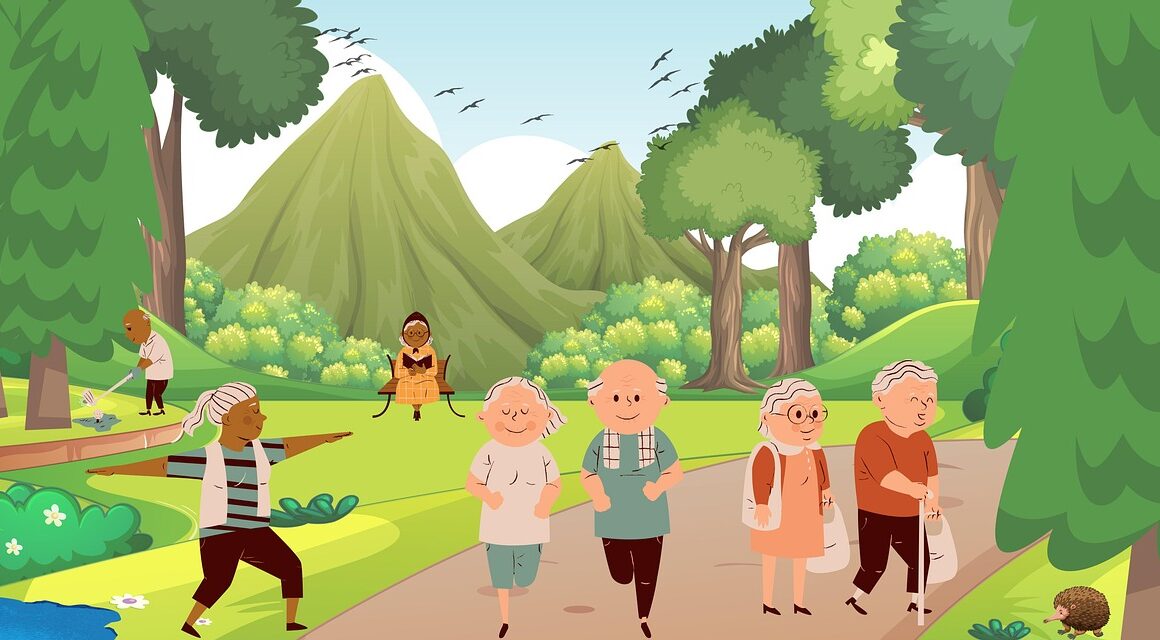How to Motivate Seniors to Participate in Fitness Assessments
Encouraging seniors to engage in fitness assessments can seem daunting, but with the right approach, it can become motivating. Start by explaining the importance of fitness assessments in promoting health. Show them how these assessments can help identify their fitness levels, ultimately guiding tailored exercise programs. Since many seniors may not see the immediate benefits, emphasize the long-term advantages, such as improved mobility and independence. Incorporating testimonials from peers who benefited helps create relatable success stories. Another effective strategy is to involve family members in the process, providing emotional support. Outline specific goals seniors can work toward after assessments for an engaging experience. This will boost interest and excitement toward participating. In addition, being empathetic and understanding their concerns about assessments can create a trusting environment, encouraging willingness. By fostering a positive, supportive atmosphere, seniors will feel more comfortable and less intimidated. Showcasing fitness assessment results in a fun and engaging way, like through games, can pique interest. Remember, patience and encouragement go a long way in facilitating participation in fitness assessments.
Creating Fun and Interactive Assessments
Designing fitness assessments that are fun and interactive is key to motivating seniors. Ensure each assessment is enjoyable and includes various activities that suit different fitness levels. Using light physical games can add an element of excitement and promote participation. Incorporate elements of social interaction to help reduce anxiety. Group fitness assessments, where seniors can work together, build camaraderie and accountability. This social interaction encourages regular attendance and participation, turning assessments into social events rather than tests. Consider providing small rewards or incentives, such as certificates or healthy snacks, to celebrate achievements after assessments. This builds a sense of accomplishment and encourages ongoing participation. Additionally, progress tracking through a visible plan can motivate seniors by showing them their improvements. Utilize engaging visuals to replay their journey and celebrate milestones. Lastly, creating themed assessment days, featuring fun costumes or themes, can make the assessments more appealing. Ensure assessments are adaptable to every individual’s needs and preferences. Ultimately, focus on retaining a positive and supportive environment where seniors feel safe and valued will enhance their willingness to participate in fitness assessments.
Recognizing Individual Motivation Factors
It’s essential to understand that each senior has unique motivation factors influencing their willingness to participate in fitness assessments. Knowing what drives an individual can help tailor approaches and increase their enthusiasm. Some seniors are motivated by health, while others prioritize social interaction or personal achievements. Take the time to ask each senior about their specific motivations and goals. Personalized approaches demonstrate care and understanding. Consider conducting informal interviews or surveys to gather their feelings and preferences. Additionally, emphasizing how fitness assessments can lead to personalized fitness plans catering to their desires fosters a sense of empowerment. Encourage them to envision their future fitness levels and the benefits of achieving these goals. Recognizing and addressing fears, such as injury or embarrassment, plays a crucial role in motivation. Reassurance and positive reinforcement can alleviate concerns. When seniors feel understood and valued, their willingness to embark on fitness assessments increases. Regular feedback acknowledging their progress further boosts self-confidence, reinforcing their motivation. Ultimately, tailoring the experience based on individual motivators creates a more inviting environment for seniors to participate willingly in fitness assessments.
Engaging Family and Friends in Fitness Goals
Family and friends serve as a powerful motivator for seniors when participating in fitness assessments. Sometimes, just knowing that someone they trust is involved can alleviate anxiety surrounding assessments. Encourage seniors to invite loved ones to accompany them during assessments for emotional support. Grouping assessments can make the experience more enjoyable through collective encouragement, creating a supportive environment. Organize events with family and friends where they can participate together. This strengthens relationships and builds enthusiasm around fitness journeys. Share the results from fitness assessments with family members. When family members celebrate improvements and milestones, it reinforces the effort and dedication of the seniors involved. Moreover, consider establishing a friendly competition among family members or caregivers that promotes participation in fitness activities. This can include tracking steps or completing specific exercises. Such initiatives foster motivation while highlighting the importance of fitness as a family value. Incorporating loved ones into their fitness journey also reassures seniors that they are connected with their support system. Remind seniors that their achievements matter, both personally and to their families, ensuring fitness assessments are seen as a collective effort.
Emphasizing Health Benefits Beyond Fitness Assessments
When discussing fitness assessments with seniors, highlight health benefits that extend beyond just physical fitness. Clearly communicate that assessments can identify underlying health issues, enabling proactive actions to prevent further complications. For instance, regular assessments can lead to improved cardiovascular health, aiding seniors in avoiding diseases. Inform them that participating helps enhance mental well-being by reducing feelings of isolation and boredom. Physical activity correlates with better mood regulation, which can significantly impact overall quality of life. Presenting this information in relatable terms can help seniors understand the relevance. Consider sharing scientific studies that underline these benefits, fostering informed decisions. Introduce stories of individuals who improved their well-being through fitness assessments to personalize the subject. Moreover, emphasize community involvement as a crucial aspect of mental engagement that can be achieved through assessments. Connecting it with opportunities for social interaction makes the entire process more appealing. By focusing on mental and emotional health benefits alongside physical ones, seniors will be more inclined to participate actively. Ultimately, health benefits encompassing various aspects of life portray fitness assessments as an essential tool for enhancing overall well-being.
Setting Realistic Goals and Expectations
Establishing realistic goals is vital in motivating seniors for fitness assessments. Assessing their starting fitness levels helps set achievable benchmarks and eliminates potential frustration. Understand that success doesn’t always equate to major transformations; every small improvement matters. Encourage seniors to respect their current abilities while aiming for progressive enhancement. Break down goals into smaller, manageable tasks to create a sense of achievement. The journey becomes less daunting when focusing on incremental changes rather than overwhelming targets. Each accomplished goal, no matter how small, serves as a motivational boost, promoting ongoing participation. Additionally, educate seniors about the importance of consistency over perfection. Fitness is a journey, not a race. Reassuring them that ups and downs are a natural part allows for more resilient mindsets. Highlight how patience is crucial to attain desired outcomes and enduring commitment fosters long-term improvements. Regular check-ins to recognize their progress can motivate seniors to stay on course. In doing so, you create a culture where assessment participation remains an anticipated and celebrated event that positively impacts their fitness journey.
Creating a Supportive Community Environment
Building a supportive community around fitness is crucial for motivating seniors to participate in assessments. A nurturing atmosphere fosters a sense of belonging that encourages ongoing engagement. Organize regular gatherings where seniors can share their experiences, tips, and challenges regarding fitness assessments. These gatherings facilitate relationship building while creating a space for shared encouragement. Establishing a mentorship program can also empower experienced seniors to guide newcomers through assessments, enhancing confidence for first-timers. This personal touch embodies a community spirit that aligns members with common goals. Additionally, promote group fitness assessments involving local community centers or gyms for more social interactions. Pilot programs featuring local instructors can inspire seniors to reach their full potential. Utilize communication channels such as newsletters or social media groups to keep members informed, fostering engagement. Highlighting upcoming events, assessment results, and success stories through these channels reinforces community ties. Engage in celebrating achievements collectively, as recognition bolsters motivation. Ultimately, when seniors feel a strong sense of community and camaraderie surrounding fitness assessments, their willingness to participate and succeed in this journey is significantly enhanced.
Providing Educational Resources and Support
Offering educational resources plays a crucial role in motivating seniors to engage in fitness assessments. Many seniors may lack information regarding the benefits of these assessments and how to achieve their fitness goals. Hosting workshops or seminars dedicated to educating seniors about factors like physical health, nutrition, and fitness can be foundational. These educational sessions serve to empower seniors with knowledge, encouraging them to take an active role in their health decisions. Consider utilizing community centers or collaborating with local health professionals to facilitate these events. Additionally, providing written resources such as pamphlets or online articles aids in sustainable learning. This accessible information helps seniors understand fitness concepts clearly. Create easy-to-follow guides to simplify the participation process in assessments. Establishing a wellness newsletter that shares tips, recipes, and success stories from peers can motivate seniors further, demonstrating tangible results from fitness assessments. Furthermore, consider offering collaborative sessions where family members can learn alongside seniors. Their involvement fosters a supportive environment for open discussions about fitness. Overall, educational resources prepare seniors mentally and physically, leading to heightened interest in participating in fitness assessments.


